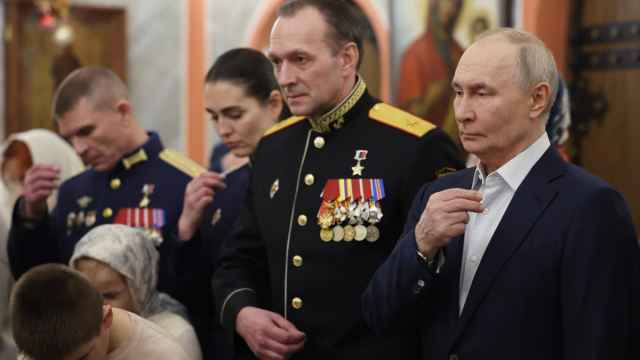The upcoming election for the coordinating council of Russia's opposition movement is turning out to be unexpectedly successful. Thanks largely to the untiring efforts of Alexei Navalny and Garry Kasparov, so many prominent opposition figures have come forward as candidates that those who are not participating have ended up looking pretty bad.
That is especially true of opposition leaders Mikhail Kasyanov and Eduard Limonov. It has become clear that they see themselves as big honchos who cannot accept the idea that a group of "little people" would decide whether or not to vote for them.
It was really disappointing that Vladimir Ryzhkov will not take part in the election. Apparently he does not want to compete. I can understand that; I don't like to compete either. That is exactly why I don't get involved in politics.
At least Ryzhkov was honest when he decided not to run. But the situation with Just Russia State Duma Deputy Ilya Ponomaryov is much stranger. He apparently believes that he is one of the most popular of the opposition figures since the movement began in December. He has tried to position himself as the third name in the protest triumvirate after Navalny and Sergei Udaltsov, who is trying to become a leader among Communists. He is also claiming to be the coordinator of people who never asked him to coordinate anything.
When pre-election polls revealed that Ponomaryov was not one of the three most popular opposition figures, rather than withdraw his candidacy, he simply forgot to pay the 10,000-ruble fee for putting his name on the ballot. His plan was apparently to force the organizers to remove his name, at which point he could turn around and accuse them of unfairly taking him out of the race. Ksenia Sobchak denied him that pleasure by paying his fee.
The election also revealed the inflated nature of Udaltsov, whose claim to fame is surviving several hunger strikes.
Note that this election was designed so that people can vote for a general list of eight candidates, where the competition is greater, and for the specific leader of either the Communist-leaning or nationalist factions, where there are fewer names and the competition is much less.
It seemed that Udaltsov did not trust his popularity, even among leftist forces, and opted to monopolize the specific left-wing ballot with his own supporters.
The result was that the remaining leftists turned in a no-confidence vote on Udaltsov, revealing that there is no such thing as a leftist majority. What's more, Udaltsov does not even dominate the marginal, tiny niche of Marxists. He is the leader of only one of many quarreling factions.
This is the most encouraging lesson for future elections. The Kremlin has scared everyone into thinking that Communists and neo-Nazis dominate the opposition and that a revolution would bring extremists to power. Now we see that the leftists and neo-Nazis don't have thousands of supporters as previously thought, but hundreds at best.
It turns out that Navalny, Sobchak and writer Dmitry Bykov are far more popular than the leftists and nationalists, whom many Russians find frightening. In fact, the left-wing and nationalist candidates have so little support that they cannot even get themselves voted onto the coordinating council without special assistance, much less end up in the Kremlin one day.
Clarifying that fact alone made these elections worthwhile.
Yulia Latynina hosts a political talk show on Ekho Moskvy radio.
Related articles:
A Message from The Moscow Times:
Dear readers,
We are facing unprecedented challenges. Russia's Prosecutor General's Office has designated The Moscow Times as an "undesirable" organization, criminalizing our work and putting our staff at risk of prosecution. This follows our earlier unjust labeling as a "foreign agent."
These actions are direct attempts to silence independent journalism in Russia. The authorities claim our work "discredits the decisions of the Russian leadership." We see things differently: we strive to provide accurate, unbiased reporting on Russia.
We, the journalists of The Moscow Times, refuse to be silenced. But to continue our work, we need your help.
Your support, no matter how small, makes a world of difference. If you can, please support us monthly starting from just $2. It's quick to set up, and every contribution makes a significant impact.
By supporting The Moscow Times, you're defending open, independent journalism in the face of repression. Thank you for standing with us.
Remind me later.





